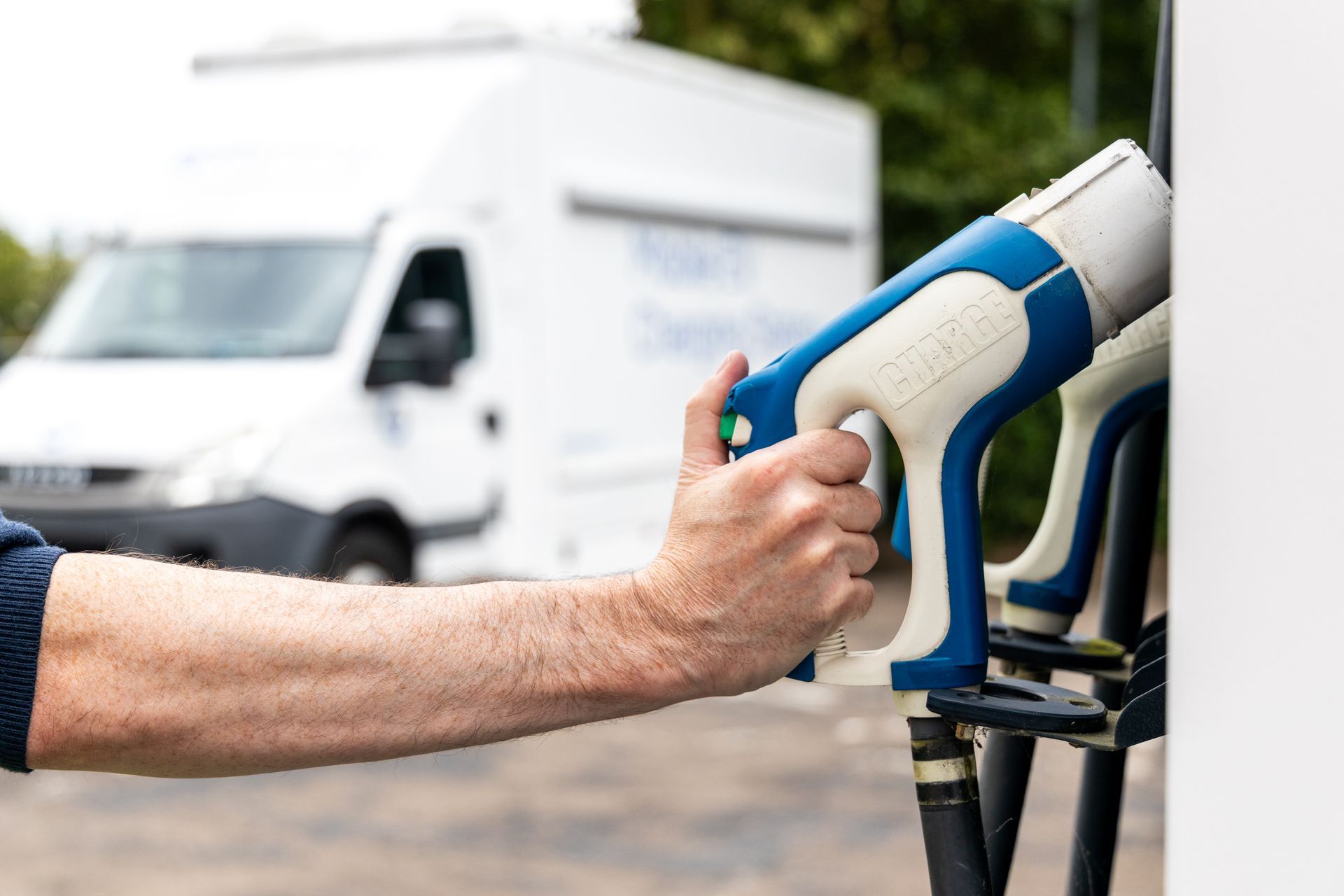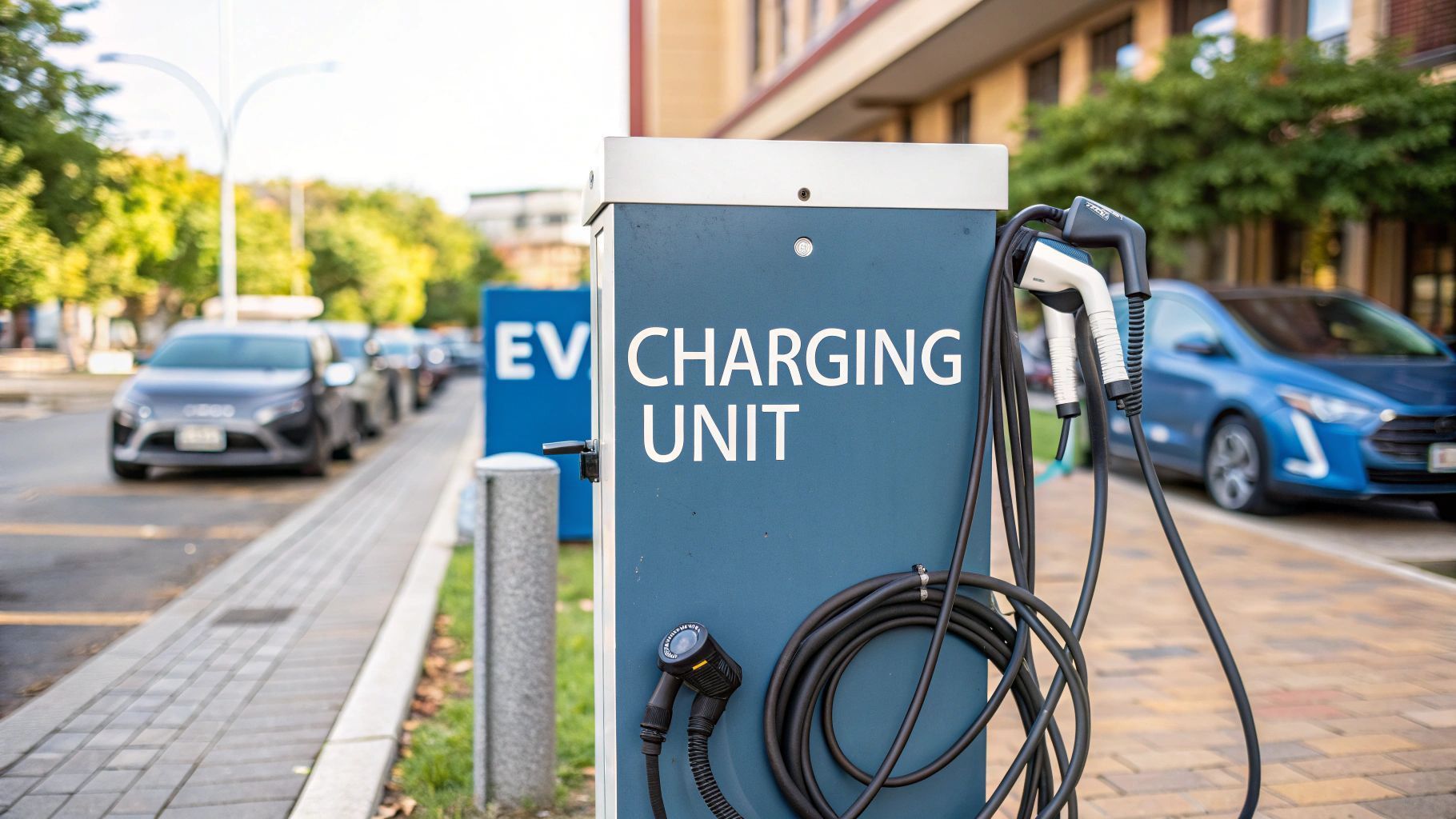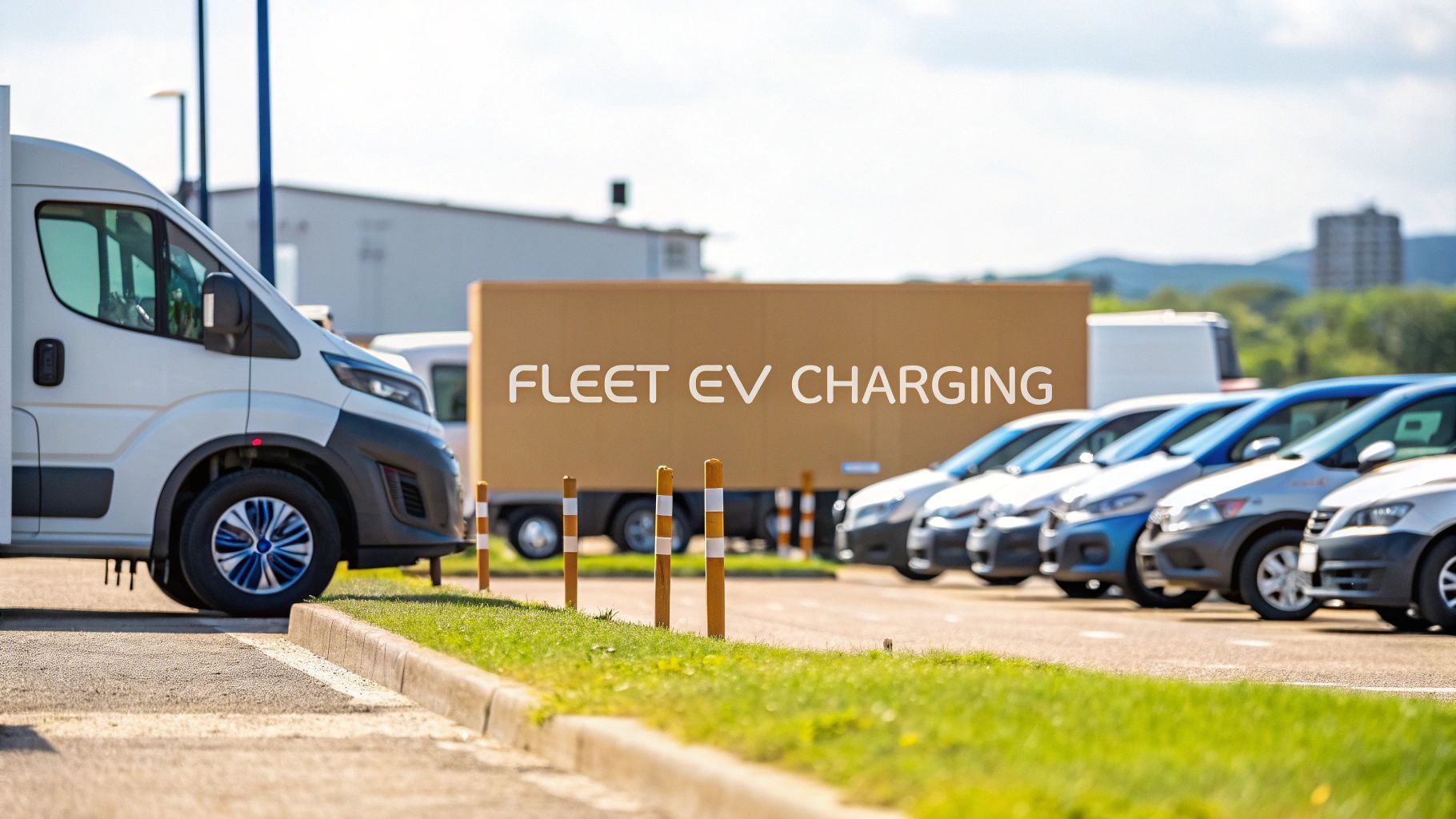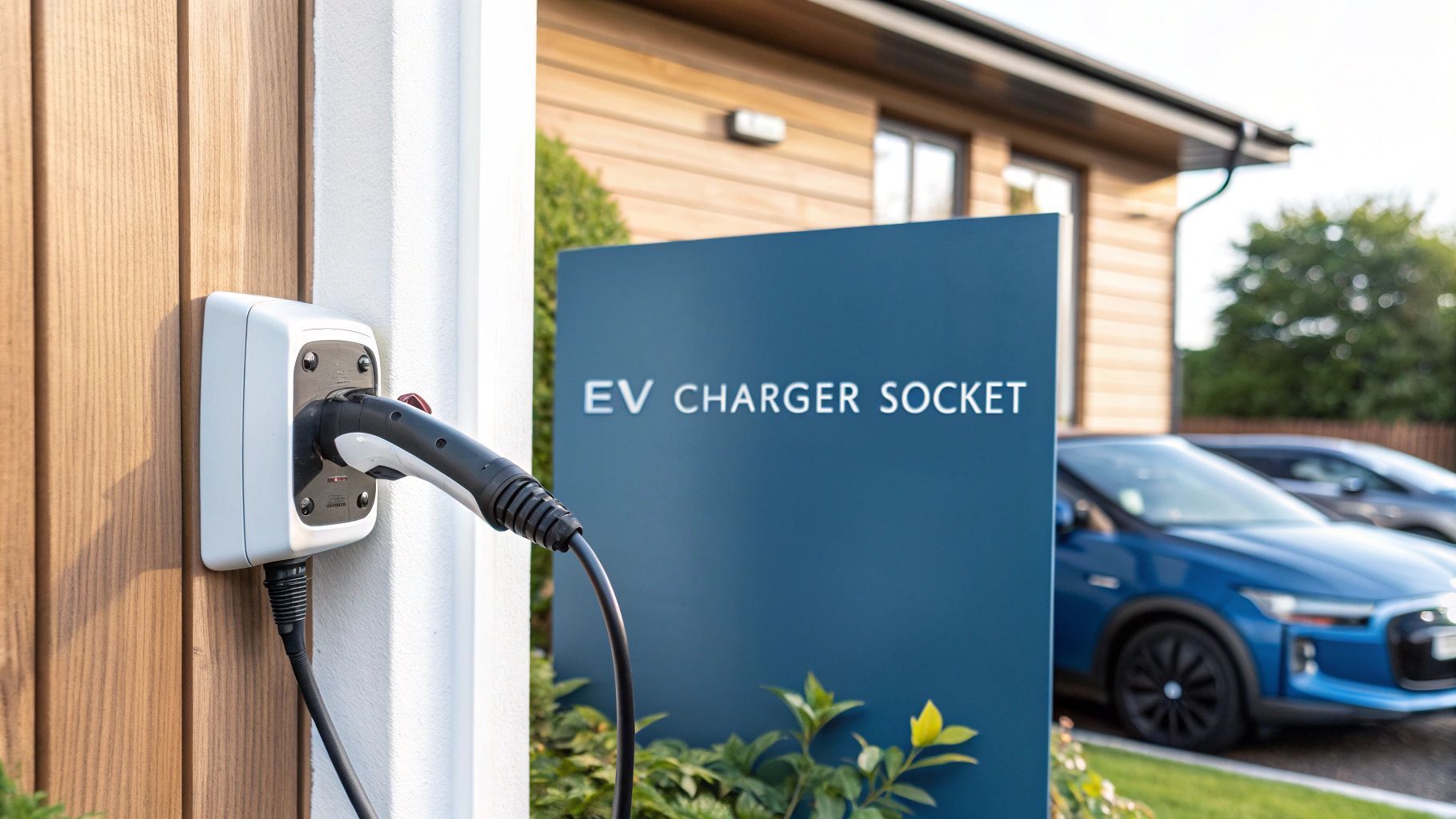What Is the True Price to Charge a Tesla in the UK?
The cost of charging a Tesla in the UK is not a single, straightforward number. It can be as little as £5-£10 for a full charge at home if you are on the right electricity tariff but can easily jump to £30-£40 or more at a rapid public Supercharger.
The biggest factor by far is whether you plug in overnight using cheap domestic electricity or rely on the pricier on-the-go networks for your top-ups.
Understanding Your Tesla Charging Options
Figuring out what it will cost to power your Tesla is a bit like buying petrol. The price you pay at a motorway service station is always going to be higher than what you would find at a local supermarket pump.
It is the same principle with EV charging. Your running costs will come down to choosing the most economical "fuelling" method for your driving habits. For most owners this boils down to three main scenarios, each with its own cost structure and advantages that directly impact your final bill.
Comparing Your Main Charging Choices
Where you plug in is the single most important variable affecting your running costs. Your options generally fall into these three buckets:
- Home Charging: This is the undisputed gold standard for affordability. If you have an EV-specific energy tariff with super-low overnight rates, you are in the best possible position.
- Public Charging: A convenient but much more varied option. Prices can differ wildly between providers, from local council car parks and supermarkets to dedicated network operators.
- Tesla Superchargers: The fastest way to get back on the road during a long journey. But as you would expect, that speed and convenience typically come at a premium price per kilowatt-hour (kWh).
This infographic gives a clear side-by-side look at the average costs for each method.
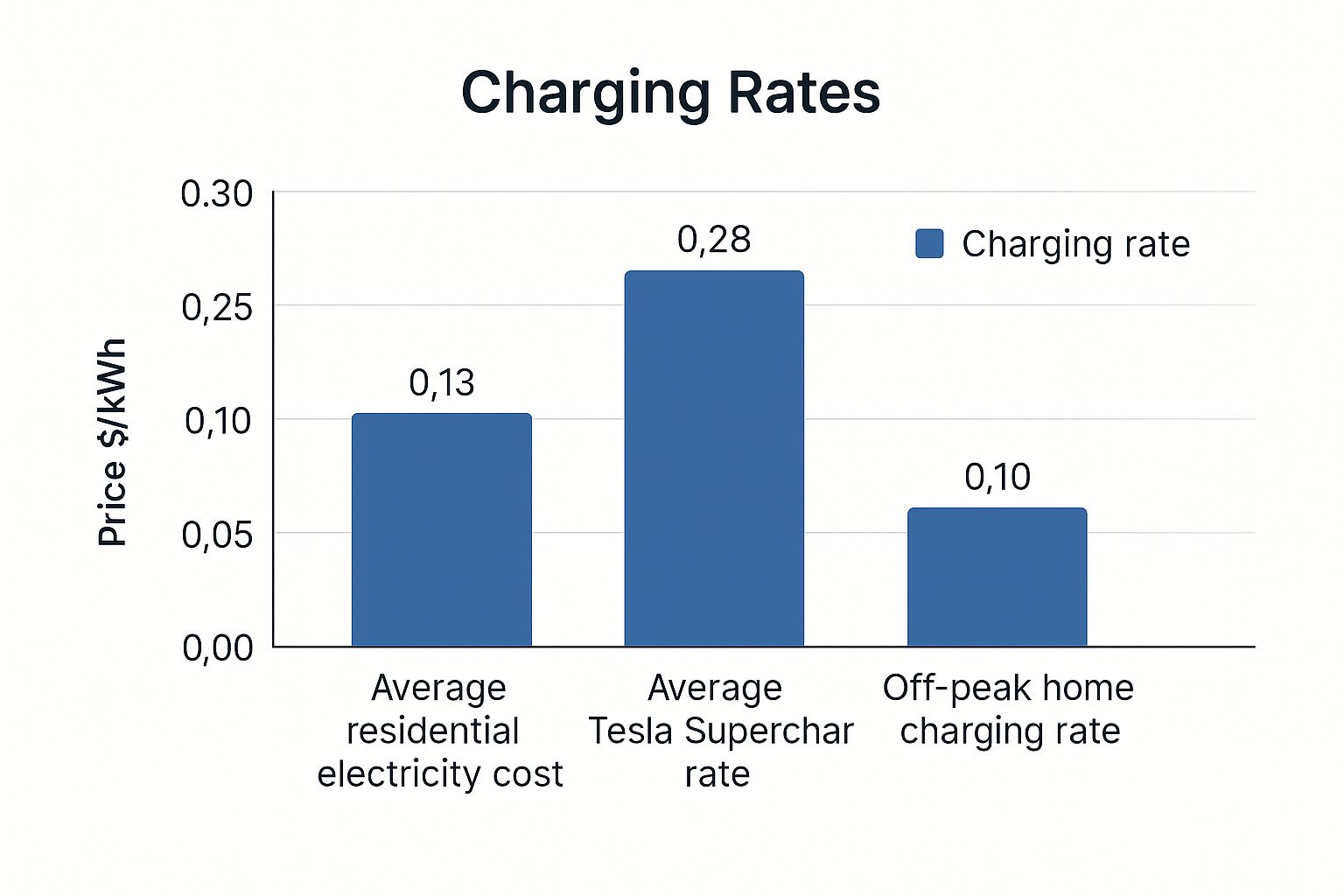
As you can see, the savings from charging at home during off-peak hours are dramatic compared to relying on the Supercharger network. But what happens when a fixed charger just is not an option? A fourth, growing alternative is mobile charging, where the power comes directly to you.
This is where understanding the technology becomes crucial and you can explore this further in our guide to battery packs for car charging in the UK to see how these systems work. This approach is a game-changer for drivers who might be stranded or simply do not have access to static infrastructure, offering a unique service-based pricing model.
To put these numbers into a real-world context, let us look at what it costs to fully charge a popular model.
Estimated Charging Costs for a Tesla Model 3 in the UK
Here’s a quick comparison of the average costs to take a 75 kWh Tesla Model 3 Long Range from empty to full using the different methods available.
| Charging Method | Average Cost per kWh | Estimated Cost for a Full Charge | Notes |
|---|---|---|---|
| Home Charging (Off-Peak) | £0.075 | £5.63 | Requires an EV-specific tariff with overnight rates. |
| Home Charging (Standard Rate) | £0.24 | £18.00 | Based on the current Ofgem price cap. |
| Public Charging (AC Fast) | £0.45 | £33.75 | Prices vary significantly between providers. |
| Tesla Supercharger | £0.55 | £41.25 | Rates can change based on location and time of day. |
These figures are estimates, of course, as real-world costs depend on your energy supplier, the specific charging network you use and even the time of day.
However, the table makes one thing abundantly clear: charging at home, especially on an off-peak tariff, offers colossal savings and is the key to keeping your Tesla's running costs as low as possible.
How Mobile Charging Unlocks New Revenue Streams
While charging at home is hands-down the cheapest way for a Tesla owner to top up, a whole new market is opening up for savvy entrepreneurs. The rise of mobile EV charging is creating a powerful business opportunity, transforming the stress of a dead battery into a premium, on-demand service. This is not just about giving stranded drivers a helping hand; it is about building a profitable venture from scratch.
The real beauty of a mobile charging service lies in its flexibility. Operators are not chained to a fixed location. They can go directly to the customer, whether they are stuck on the motorway, parked at a workplace with no chargers or living in a flat with no off-street parking. That level of convenience is something people are absolutely willing to pay a premium for.
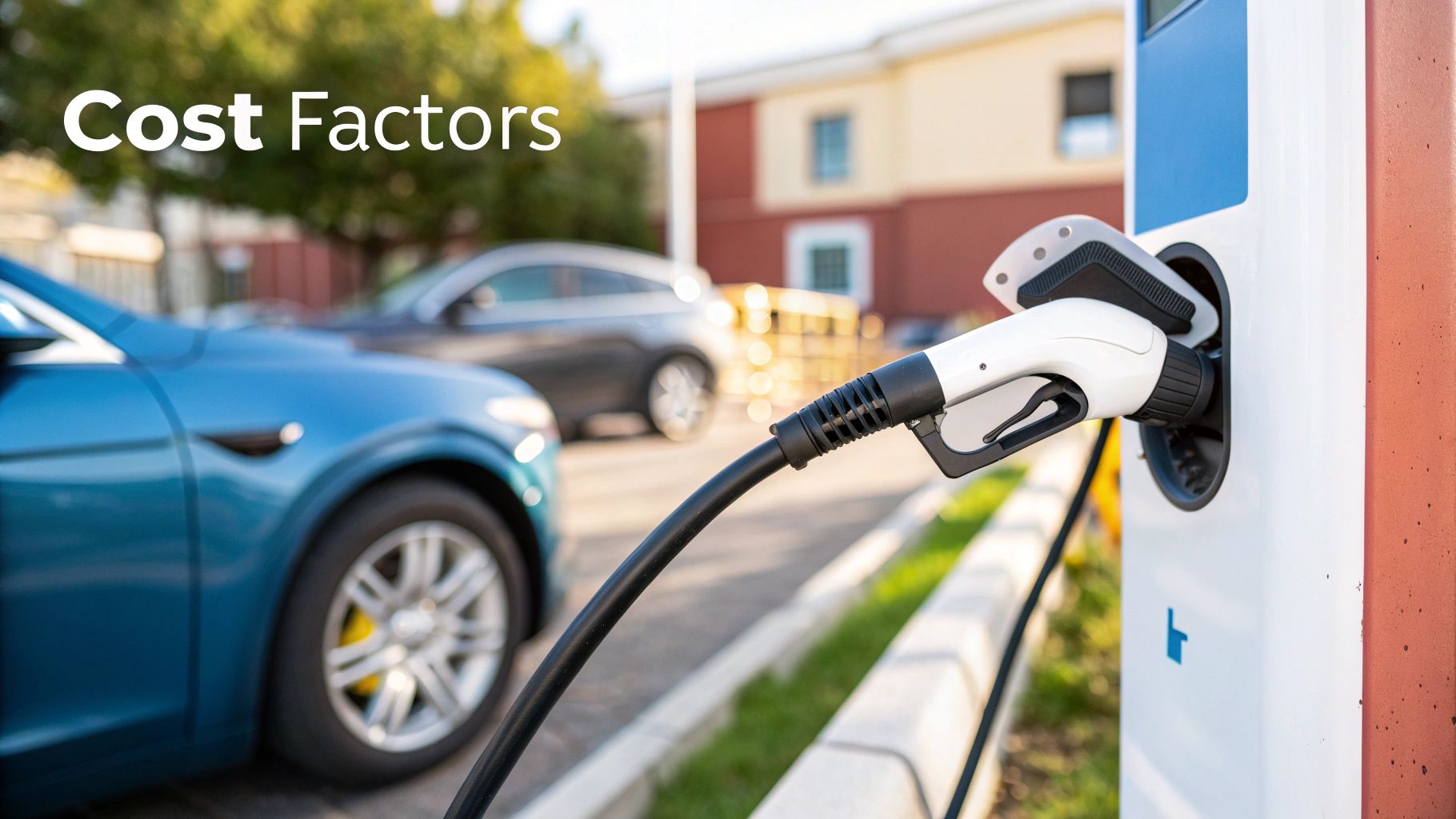
Calculating Your Mobile Charging Profit
The financial potential here is huge but it hinges on a smart pricing strategy. You are not just selling electricity; you are selling a complete roadside rescue package. A solid pricing model needs to cover all your operational costs before you even think about adding a healthy profit margin.
Here are the key things to bake into your pricing when you charge a Tesla or any other EV:
- Call-Out Fee: This is your base charge just for showing up. It should cover your time, fuel and vehicle wear and tear. A standard fee could sit anywhere from £50 to £100 , perhaps more for unsociable hours.
- Cost per kWh Delivered: You have to account for the electricity you are supplying. This could be a fixed rate per kWh, perhaps around £0.70 - £0.90 . Yes, that is higher than public chargers but it reflects the bespoke nature of the service.
- Mileage Surcharge: For jobs outside a set radius, a per-mile charge is a must. It covers the extra fuel and time, ensuring those long-distance rescues are still profitable.
Pull all those elements together and a single emergency call-out delivering 25 kWh of charge could easily bring in £100 - £150 in revenue .
The true value is not in the electricity itself. Customers are paying for a solution to an immediate, stressful problem. That is what creates the significant earning potential for a mobile charging operator.
Scaling Your Mobile Charging Business
Even a solo operator with a well-marketed service could handle several call-outs a day. Just imagine completing four jobs daily at an average of £120 each. That quickly adds up to nearly £500 in daily revenue, showing just how scalable this business can be.
As the number of EVs on UK roads keeps climbing, so will the demand for flexible charging solutions. By building a reputation for reliability and rapid response, a mobile charging business can lock in lucrative contracts with fleet operators, hire car companies and corporate clients. This is how you turn a simple service into a thriving enterprise, all by monetising convenience.
The Rise of Mobile Charging as a Business
Beyond the world of fixed charging points lies a flexible and increasingly vital solution: mobile EV charging. Think of it as a breakdown service but specifically for flat electric car batteries. This model presents a huge business opportunity, capitalising on convenience for drivers who are stranded or simply cannot get to a static charger.
This on-demand service is transforming the stress of a depleted battery into a solvable problem. Operators are not tied to a single spot; they travel directly to a customer, whether that is on a motorway hard shoulder, a company car park without charging facilities or a block of flats with no off-street parking. This level of personalised service is a valuable commodity and one that customers are happy to pay a premium for.
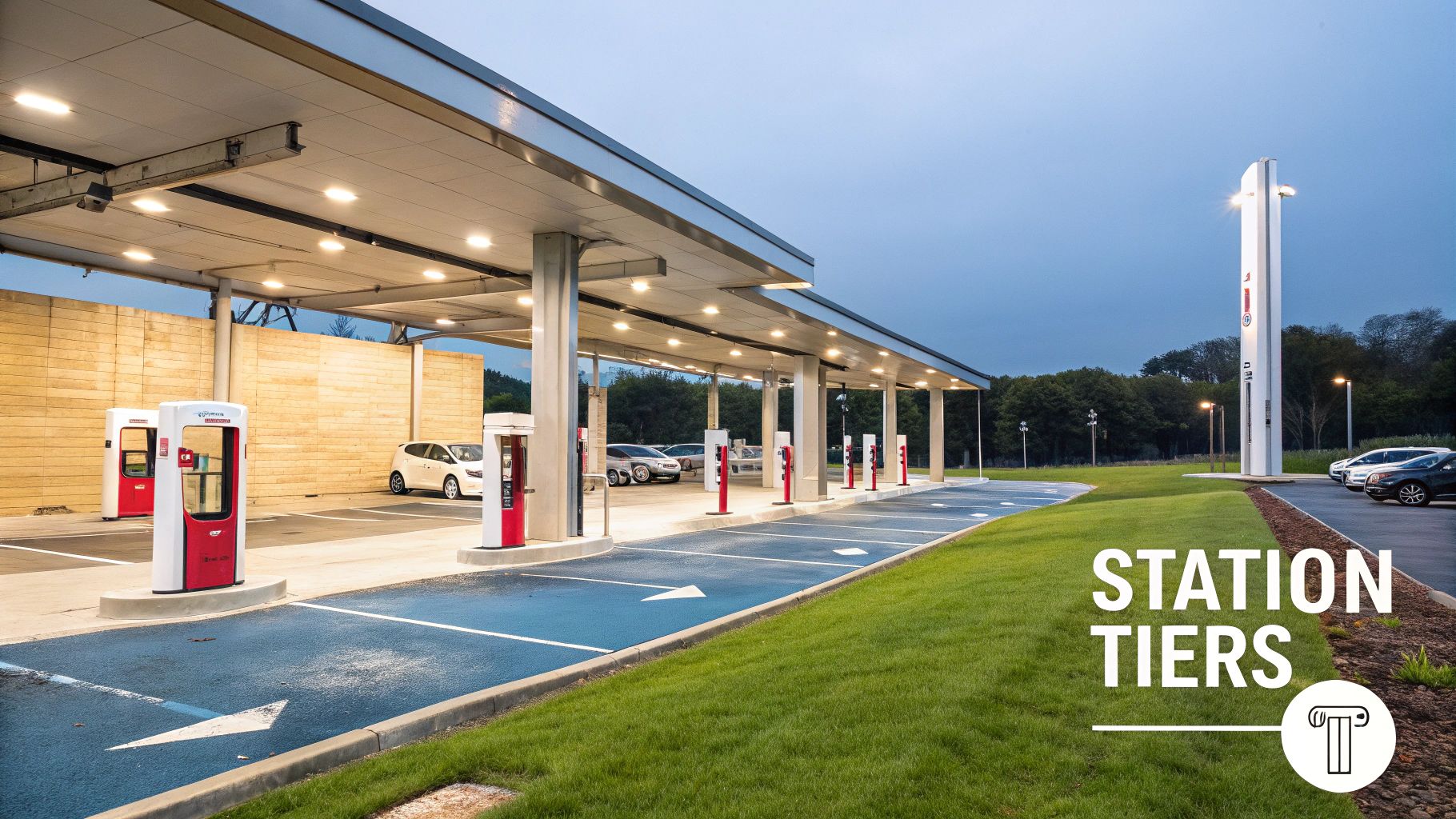
Monetising On-Demand Power
The financial potential here is substantial but success hinges entirely on a well-structured pricing model. An operator is selling more than just electricity; they are offering a rapid solution to an urgent, stressful problem. A profitable price must therefore cover all business costs while reflecting the premium nature of the service.
A typical pricing structure would include a few key components:
- A Standard Call-Out Fee: This is your base charge for attending a job, covering time, fuel and vehicle wear. This could easily range from £50 to £100 , depending on the time of day and location.
- A Per-kWh Rate: The electricity itself has to be paid for. A rate of around £0.70 to £0.90 per kWh is realistic, reflecting the massive convenience factor over static public chargers.
- Mileage Costs: For jobs outside a defined service area, a per-mile surcharge is essential to make sure long-distance call-outs remain profitable.
Pulling these elements together, a single emergency call-out that delivers 25 kWh of charge could generate between £100 and £150 in revenue. This demonstrates a clear path to profitability. For a deeper look at the various options available, you can explore our guide to understanding the UK's public EV charging point networks in 2025 , which contrasts fixed infrastructure with mobile solutions.
Scaling Your Mobile Charging Operation
Even a sole operator can build a lucrative business. Completing just four average call-outs per day at £120 each could result in daily revenue approaching £500 . This really highlights the impressive scalability of the mobile charging model.
The core value you are selling is not the electricity itself but the immediate resolution of a driver's problem. This is the foundation upon which a profitable mobile charging enterprise is built.
As the number of electric vehicles on UK roads continues to grow, so will the demand for these flexible charging solutions. By building a reputation for reliability and rapid response times, a mobile charging business can secure valuable contracts with fleet operators, car hire firms and other corporate clients, transforming a simple service into a thriving and profitable company.
Away from the world of fixed charging points, another solution is gaining ground: mobile EV charging. Think of it as a breakdown service but purely for electric cars with flat batteries. It is a business model built entirely on convenience, turning up to help drivers who are stranded or simply cannot reach a static charger.
This on-demand service transforms the stress of a dead battery into a quickly solved problem. Operators are not tied to one spot; they travel directly to the customer, whether that is on a motorway hard shoulder, a company car park without charging facilities or a block of flats with no off-street parking. This level of personal service is a valuable commodity and it is one that customers are more than happy to pay a premium for.
Building a Profitable Revenue Model
The financial potential here is huge but success really hinges on a well-thought-out pricing model. You are selling more than just electricity; you are offering a rapid solution to an urgent, often stressful, problem. A profitable price needs to cover all your business costs while reflecting the premium nature of the service.
To set a price for charging a Tesla or any EV that actually makes you money, you have to account for several key factors:
- A Standard Call-Out Fee: This is your base charge for just showing up, covering your time, fuel and vehicle wear and tear. This could easily range from £50 to £100 , depending on the time of day and location.
- A Per-kWh Rate: The electricity itself has to be paid for. A rate of around £0.70 to £0.90 per kWh is realistic, reflecting the massive convenience factor compared to static public chargers.
- Mileage Costs: For jobs outside a defined service area, a per-mile surcharge is essential to make sure those long-distance call-outs remain profitable.
Pulling these elements together, a single emergency call-out that delivers 25 kWh of charge could generate somewhere between £100 and £150 in revenue. This shows a clear path to profitability for anyone looking to get into mobile charging.
Scaling Your Mobile Charging Operation
Even a sole operator can build a pretty lucrative business. Completing just four average call-outs a day at £120 each could result in daily revenue approaching £500 . It really highlights just how scalable the mobile charging model can be.
The core value you are selling is not the electricity itself but the immediate resolution of a driver's problem. This is the foundation upon which a profitable mobile charging enterprise is built.
As the number of electric vehicles on UK roads continues to grow, so will the demand for these flexible charging solutions. To manage customer relationships and keep things running smoothly as your venture grows, tools like a specialised CRM for Field Service become essential for maintaining service quality and efficiency.
The market for electric vehicles is also maturing. Recent trends show that downward pressure on used Tesla prices in the UK remains persistent, with the Model 3 declining 17.63% year-over-year and the Model Y down 22.42% . This correction makes Teslas more accessible to a wider audience, which in turn expands the potential customer base for on-demand charging services. You can learn more about these price trends and how they are shaping the market.
Calculating Your Profit as a Mobile Charging Operator
Right, let us get down to brass tacks. Moving from the idea of a mobile EV charging business to actually making it work means crunching the numbers. You need a solid business case that maps out your initial investment, keeps a close eye on running costs and—most importantly—helps you set a price that turns a profit on every call-out. This is the financial roadmap that separates a hobby from a sustainable business.
The first hurdle is always the initial outlay. Your biggest costs will be buying a suitable van, the mobile charging unit itself and getting the right business insurance sorted. No doubt, these are big investments but they are the foundation of your entire operation.
Then you have the day-to-day operational costs. We are talking fuel for the van, maintenance for both the vehicle and the charger and the marketing budget to get your name out there and land those first crucial customers.
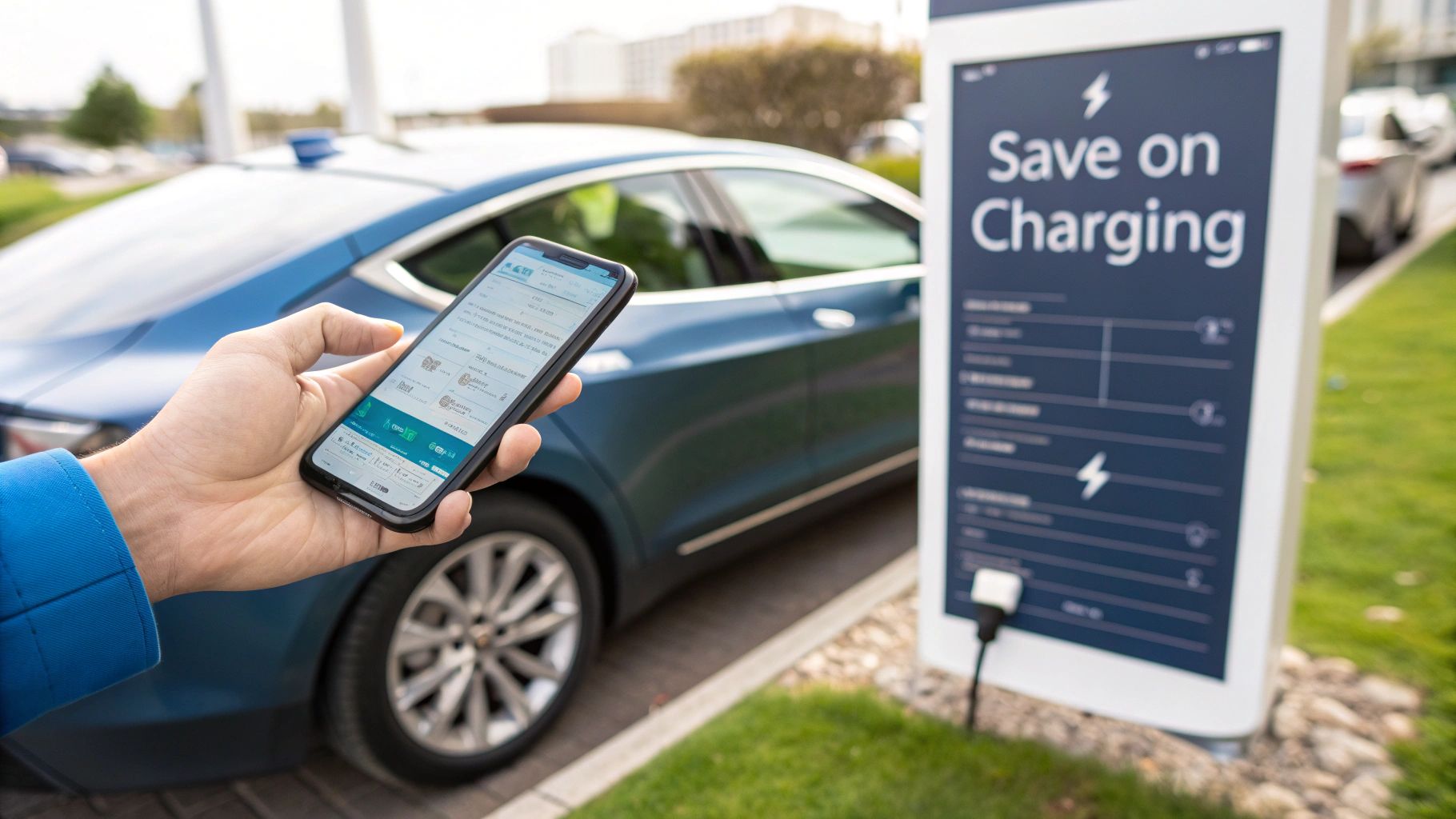
Crafting a Profitable Pricing Formula
Setting your prices is not just about plucking a number from thin air. It is a careful calculation to make sure you are covering every expense and still making money on each job. A crucial first step is to run a proper break even analysis —this will show you exactly when your business tips from costing money to making it.
Your pricing formula should be simple enough for customers to understand but detailed enough to protect your bottom line.
A good model should always include:
- Cost of Electricity: This is the direct cost of the energy you are selling. Figure out what it costs you to generate or store that power, then add a healthy markup.
- Service Call-Out Fee: This is your bread and butter. It is a fixed fee that covers your time, expertise and the sheer convenience of your on-demand service.
- Mileage Charge: It is essential to have a per-mile fee for jobs outside a set radius. This covers the extra fuel and travel time, making sure those longer trips are still worth your while.
- Profit Margin: Once all your costs are covered, this is the percentage you add on top. This is your actual take-home pay and it should reflect the premium, problem-solving value you provide.
By pulling these elements together, you get a pricing structure that is both transparent and profitable. For a much deeper dive into the numbers that make this industry tick, our guide on the economics of mobile EV charging is an invaluable read.
Projecting Your Potential Earnings
The true potential of this business really clicks into place when you start mapping out different profit scenarios. How many call-outs can you handle in a day? That number directly drives your revenue and shows just how scalable this business can be.
Your most valuable asset is not just the charger; it is the ability to deliver power precisely when and where it is needed most. This convenience is what customers pay a premium for and it is the key to maximising your profit margins.
Let us look at a quick example to see how the numbers could stack up for a single job. This table breaks down a typical call-out, showing just how quickly the earnings can accumulate.
Sample Profit Calculation for a Mobile Charging Service Call
| Expense/Revenue Item | Example Cost/Price | Notes |
|---|---|---|
| Service Call-Out Fee | £70.00 | Your base charge for attending the job. |
| Energy Provided (20 kWh @ £0.85/kWh) | £17.00 | Covers the cost of electricity plus your markup. |
| Mileage (5 miles @ £1.50/mile) | £7.50 | Covers travel outside your standard service area. |
| Total Revenue Per Call | £94.50 | The total amount billed to the customer. |
| Operational Costs Per Call | - £25.00 | Estimated fuel, electricity cost, and wear. |
| Net Profit Per Call | £69.50 | Your final profit for a single job. |
Based on these figures, completing just four similar jobs in a day could bring in a net profit of nearly £280 . It is a powerful illustration of the earning potential here. A well-run mobile charging service has serious scalability, turning the growing demand for EV power into a genuinely lucrative venture.
Got Questions About Tesla Charging Costs?
Whether you are a new Tesla owner or a business operator weighing up your options, understanding the variables that go into charging costs is key. Let us break down some of the most common questions to give you a clear picture of what to expect.
We will tackle everything from cheap home charging and the real cost of Superchargers to whether a mobile charging business can actually make you money.
How Much Does a Full Model Y Charge Cost at Home?
For the vast majority of Tesla drivers, plugging in at home is, by a huge margin, the most affordable way to charge. The exact cost boils down to your electricity tariff but if you can get onto an off-peak rate designed for EV owners, the savings are incredible.
Let us take a Tesla Model Y Long Range with its 75 kWh battery as an example. If you are on a specialised EV tariff with a low overnight rate, like £0.075 per kWh , the maths is simple. You just multiply the battery size by your electricity cost.
The Calculation:
75 kWh (Battery Size) x £0.075 (Cost per kWh) = £5.63 for a full charge
That is right—a full charge for less than the price of a fancy coffee. It is this cheap overnight power that makes home charging the absolute bedrock of economical EV motoring.
Are Tesla Superchargers Always More Expensive?
Tesla's Supercharger network is built for one thing: getting you back on the road fast. That speed and convenience usually come at a premium but it is not always the most expensive option when you are out and about.
While the rates do change, a typical Supercharger price is around £0.55 per kWh . That is often competitive with—and sometimes even cheaper than—other big ultra-rapid networks like Ionity or Gridserve, especially if you are not paying for one of their monthly subscriptions.
The main thing to remember is that while Superchargers cost a lot more than charging at home, their pricing is often in the same ballpark as other rapid chargers. The real choice comes down to balancing cost against the sheer convenience and reliability of Tesla’s network, particularly on a long journey where every minute counts.
Can You Make a Good Living with a Mobile EV Charging Business?
Absolutely. Running a mobile EV charging service can be a very profitable venture but success hangs on a few key factors. As we have covered, the business model is not really about selling electricity; it is about selling convenience as a premium service.
Profitability comes from a smart pricing strategy. This usually involves a call-out fee, a healthy mark-up on the electricity you deliver and maybe even a mileage surcharge. It is not uncommon for a single call-out to bring in over £100 in revenue , leaving a decent profit margin after your operational costs are covered.
To build a business that thrives, you need to focus on:
- Strategic Location: Set up shop in areas with plenty of EVs but not enough chargers.
- Smart Marketing: Get the word out to drivers who are stranded or need scheduled charging at their location.
- Rock-Solid Reliability: Build a reputation for being the fast, dependable service people can count on.
With more and more EVs hitting UK roads every year, the demand for flexible, on-the-go charging is only going to grow. It is a real business opportunity for anyone ready to jump in.
Ready to turn the demand for on-the-go EV power into your next business venture? ZAPME offers pioneering mobile EV charging units designed to get you started. Explore our solutions and find the right fit for your business goals at https://www.zapme.biz.

